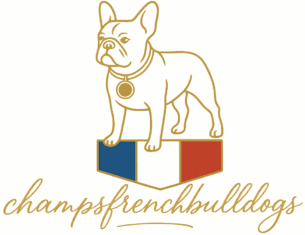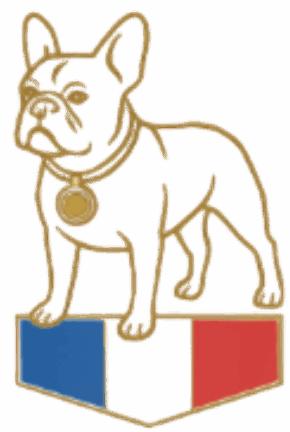Whys its so Important to your Frenchie in Shape?
Why keeping your Frenchie lean literally adds comfort (and years) to their life We have scrolled TikTok, and it’s easy to find French Bulldogs that look “cute and chunky.” We get it—the rolls, the cheeks, the waddle. But as Frenchie breeders, it honestly makes us a little sad, because extra weight isn’t just a look. For a brachycephalic, compact breed like the French Bulldog, weight is workload: on the joints, on breathing, on the spine, on the heart, and even on the skin. At Champs French Bulldogs, we keep our dogs at a healthy body condition—not skinny, not bulky, just athletic for their frame—because it’s the simplest, most powerful gift you can give a any dog. Body condition is basically the everyday version of “ideal weight.” Vets use a simple hands-and-eyes check: you should be able to feel ribs with a light sweep of your fingers without digging, there should be a visible waist from above, and a gentle tuck from chest to belly when viewed from the side. On Frenchies this can be tricky because they’re barrel-chested up front and compact behind, so we pay more attention to the feel than the fluff. If you have any doubt, ask your veterinarian to show you the quick check at your next visit, or review a standard veterinary body-condition chart before you start changing food or portions Why does it matter so much for Frenchies? Extra pounds amplify everything you don’t want amplified. Joint stress shows up faster as reluctance to jump or climb, bunny-hopping, or general stiffness after play. and never let your french bulldog stand on there back legs!! all that weight is on there spine and its super sad to see that many people let there dog do that thinking its cute mean while they will be having to pay surgery for the spine so keep that in mind. Food is where most people overdo it. Wolves don’t eat every single day, and while we’re absolutely not telling you to skip meals for your Frenchie, it’s a useful reminder that dogs are biologically comfortable with modest, predictable amounts of food. For adult French Bulldogs, we’ve had excellent results with small portions twice or three a day, measured consistently, and adjusted slowly based on energy, stool quality, and body condition. We do not apply this rhythm to puppies—growing Frenchies need more frequent, calorie-appropriate feedings, and we follow our vet’s guidance closely during growth spurts. If you’re new to our program or want to see how we structure meals, take a look at our feeding approach here: [link → internal: Frenchie Raw Feeding Guide] and our new-owner care notes: [link → internal: Puppy Care]. Activity matters, but we keep it Frenchie-smart And if you’re in Naples, Florida, keep an extra close eye on the heat and humidity—brachycephalic breeds like Frenchies work harder to cool themselves. We treat outdoor time like a monitored workout: sunrise or sunset walks only, frequent shade breaks, and lots of water. We even use a dog stroller for mid-walk cooldowns or to let seniors/short-nosed pups enjoy fresh air without overexerting—it looks funny, but it’s smart and safe Check out our The Florida Heat & Humidity Guide: Keep Your French Bulldog Cool & Safe here a photo of the Frenchie gang wining a costume contest with the stroller Keeping activity gentle—especially in Naples’ heat—protects joints, skin, and breathing. If your Frenchie is carrying extra weight, trim portions first and use low-impact play; joint support can help comfort during the transition (see our guide: [link → internal: Hip & Joint Supplements for French Bulldogs]). Let’s talk joints, because being “very chubby” is never just cosmetic for a Frenchie. Extra weight multiplies the load on knees and hips and can aggravate patellar luxation or make normal wear-and-tear feel worse. If you’re in the process of trimming down an overweight Frenchie, it’s a great time to add joint support to the routine. We outline exactly what we use—Glucosamine, chondroitin, MSM, and when we reach for NuVet’s joint line—in our detailed guide here: Hip & Joint Supplements for French Bulldogs Supplements aren’t a cure, and they don’t replace portion control, but together with weight management they’re a smart, comfort-boosting combo for adult and senior dogs and puppies. One last encouragement: the “before and after” that no one posts is how a lean Frenchie feels—lighter steps, brighter eyes, easier breathing, better play, calmer naps. That’s the real glow-up. Keep body condition front and center, and everything else—from training to joint comfort—gets easier. Related resources you might find helpful:Read our in-depth joint guide with Glucosamine details and NuVet notes: [link → internal: Hip & Joint Supplements for French Bulldogs]Review a standard veterinary body-condition chart before making changes: [link → external: Vet body-condition score overview]Learn about the breed generally: [link → external: AKC French Bulldog] This article reflects our experience as breeders and is not a substitute for veterinary care. Always consult your veterinarian for personalized advice, especially for puppies, seniors, or dogs with medical conditions.
Whys its so Important to your Frenchie in Shape? Read More »






